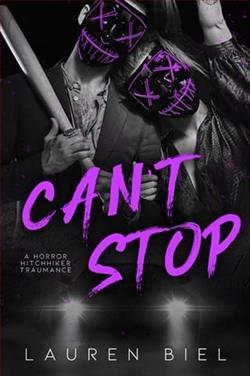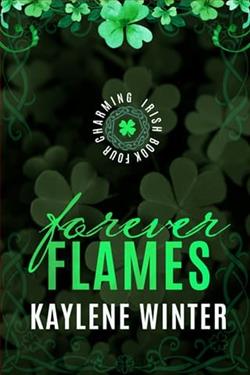Page 71 of High Hopes
He showers, climbs into the bed across from mine, and falls into an easy sleep. For me, the silence is loud, pressing in on all sides. The adrenaline from the game is long gone, replaced by this strange, heavy emptiness.
I scroll through my phone, reading the same notifications I’ve already cleared, hoping for something—anything—to distract me. A text from my mom asking about the game. An email from a professor reminding us about the final project. A random spam email about discounted protein powder.
Instead, I lie in bed staring at the ceiling, a bit hopeless. Chase is leaving. Birdie’s still not talking to me. The season’s over.
I feel untethered. It’s like everything I’ve been holding on to is slipping through my fingers, one piece at a time. The team, my roommate, her. All of it disappearing at once.
I felt like this after James and Hayes left, too. Like the world was shifting under my feet, and I couldn’t find solid ground. But things eventually got better. I found my rhythm again, settled into a new routine, and it didn’t feel so uncertain anymore.
But Birdie isn’t a roommate I can replace or a teammate I can adjust to losing. She’s something else entirely.
I think about the way she smiles when she teases me, the way she kisses me like I’m the only person in the world. The way she makes me feel like I belong, like there isn’t something wrong with me. Around her, I don’t have to try so hard—I can just be.
And that’s the thing. This doesn’t feel like something I can bounce back from, not after a loss like that. Not when it’s her.
I can’t make it permanent. I won’t. Not if I have any chance of fixing this. Birdie means too much to let her slip away without a fight.
25
BIRDIE
We’ve beenon break for a week, and I’m still spiraling into self-doubt, into this pit of uncertainty I can’t seem to climb out of. I haven’t worked on any new pieces, haven’t touched the wheel, haven’t even sketched anything. The idea of starting something new, of trying and failing again—it’s debilitating.
I haven’t spoken to Liam, either.
He texted, right after Thanksgiving, asking if I’d made it home okay. I stared at the screen for twenty minutes before turning my phone off. When he showed up at my apartment, I pretended I wasn’t there, even though I knew he could probably hear the TV through the door.
I know I’m being unfair to him, shutting him out when he’s done nothing wrong. But facing him feels impossible right now.
Sena’s home in Chicago, and I took the bus to stay at my dad’s place for the entirety of winter break. It’s been years since I’ve stayed over this long. I love my dad, but my independence is important to me.
Usually, I make excuses—work, classes, anything to keep the visits short and sweet. This time, I couldn’t stand the thought of sticking around Dayton. Not with everything that’s happened, where the reminders of my failures would be all around me.
I can’t pick up any extra shifts at work, either. The bookstore is closed for the next month. There’s no budget for seasonal help, and my usual hours are frozen until spring semester starts.
So, I’ve been filling the days with meaningless tasks. Cleaning my dad’s house, binge-watching shows I’ve already seen, scrolling endlessly on my phone. I even reorganized the junk drawer in the kitchen yesterday, sorting every paperclip and rubber band into neat little piles like it was some kind of art project.
I’ll do anything to keep my mind occupied, away from the glaring reminder of everything I’ve lost. And today, I have something real to occupy me—a one-year checkup for the accident.
The ride to the doctor’s office is quiet, almost suffocating in its silence. My dad drives, his hands steady on the wheel, but I can feel his eyes flick to me every so often. He doesn’t ask if I’m okay, doesn’t try to fill the silence with empty words. He doesn’t need to.
When we get to the office, I check in at the front desk and sit in the same stiff chair I sat in a year ago, waiting to hear if I’d ever fully recover. Back then, everything was blurry—pain, guilt, and grief tangled together into one endless knot.
Now, it’s just . . . dull. The physical wounds have healed, but the weight of it all hasn’t lifted.
A nurse calls my name, and I follow her into an exam room. She takes my vitals. She asks me the usual questions—any headaches, dizziness, or changes in vision?
“I had a migraine a few weeks ago, but none since. Just minor headaches here and there.”
The nurse jots that down, offering a quick, reassuring smile before leaving the room.
The doctor arrives a few minutes later, flipping through my chart as he sits on the rolling stool. “Well, Bridget,” hesays gently. “How’s everything feeling? Any lingering pain or discomfort?”
“No, everything feels fine.”
He tip-taps away on his laptop, then, “That’s good to hear. Your scans look clear—no residual issues from the fractures, and your head injury seems to have healed well. I’d say you’re in excellent shape.”
I nod, but the words don’t bring the relief they should. Instead, there’s a strange hollowness, like I’ve been expecting him to say something else, something that would explain why I still feel so stuck. So tragically unmoored.















